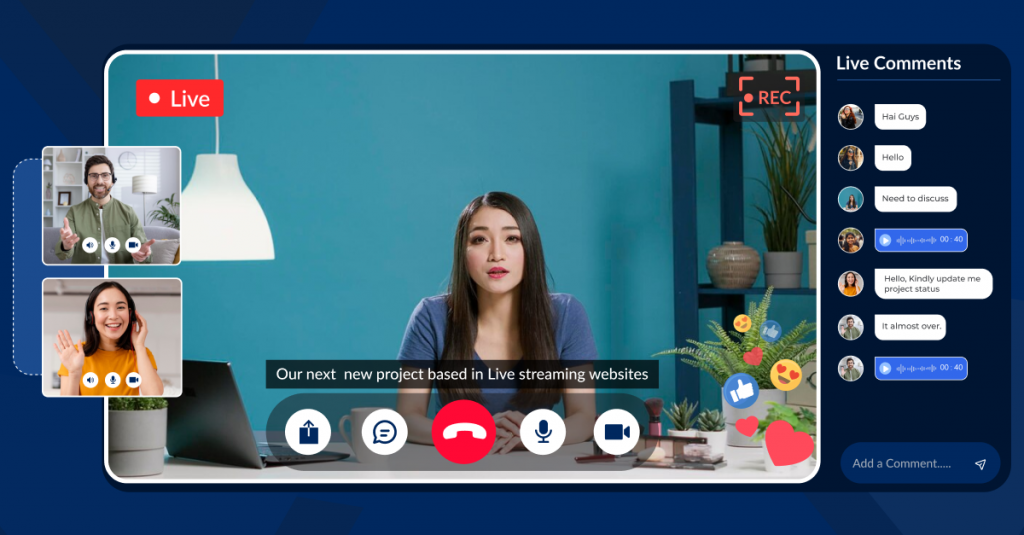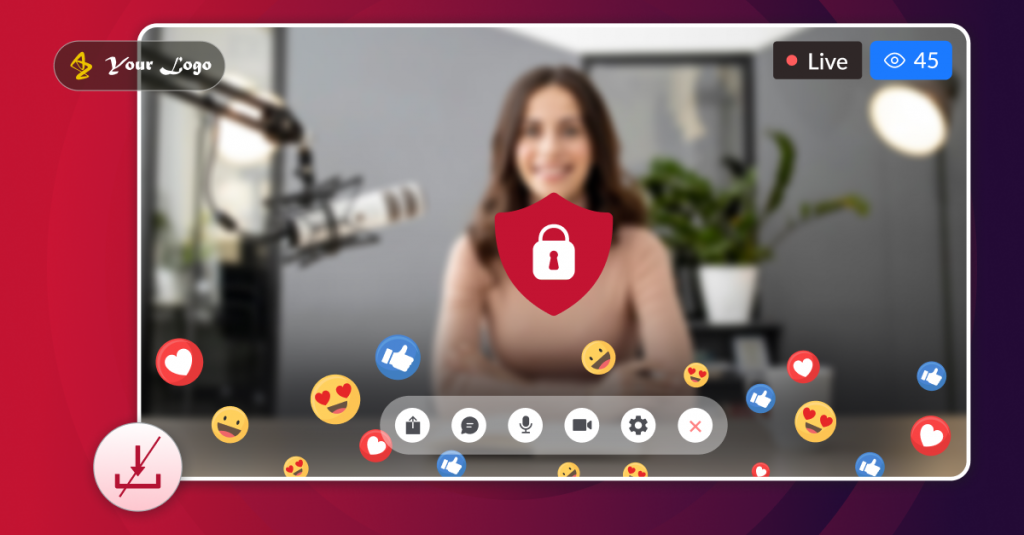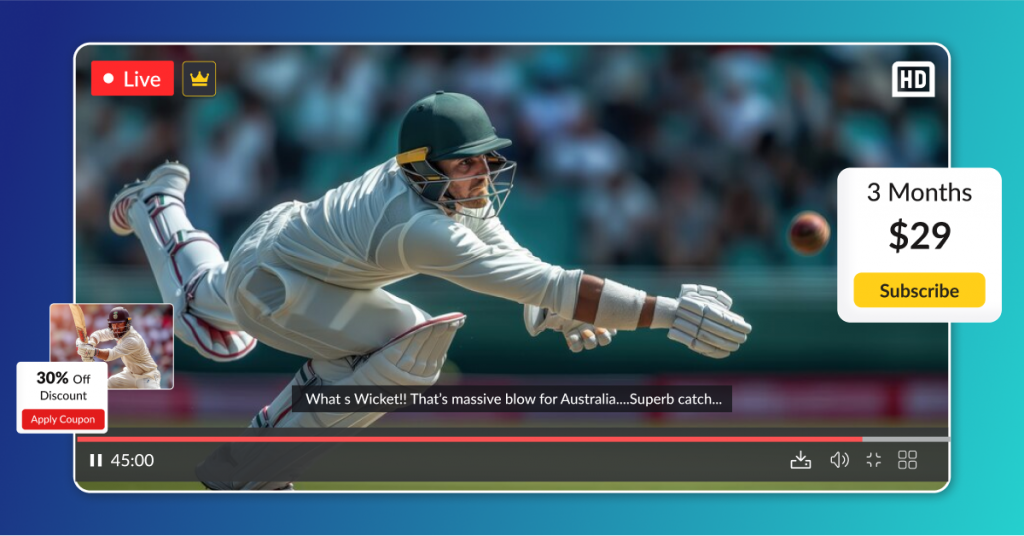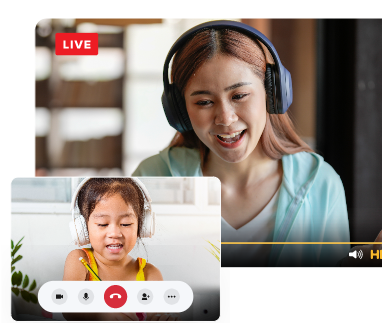How to Create a Live Streaming Website in 2024?
How to create a live streaming website is the most searched question and the results are amazing for every streaming website owner, know how!
Live streaming websites are everywhere. They offer tremendous utility benefits for all stakeholders involved — website owners, audience, and advertisers.
Firstly, website owners benefit from increased engagement and incoming traffic, leading to potential revenue growth. Secondly, for the audience, it offers real-time and interactive content.
Consequently, it fosters a deeper connection with their favorite creators.
Thirdly, advertisers gain exposure to a larger, engaged audience. It enhances brand visibility and potential sales. So, it’s a win-win-win situation for all.
Live streaming website owners witness faster growth, audiences enjoy exciting content, and advertisers reach their target market effectively.
And for this reason, the trend in concurrent viewership for live-streaming videos is witnessing a rapid increase.
According to a Go-Globe report, 80% of people prefer watching live videos from brands rather than reading blog posts.
Additionally, an impressive 82% favor live video over regular social media posts.
And if that’s not enough, research by Livestream reveals that the average time spent watching live videos has shot up by over 80% in the past year.
These eye-opening statistics highlight the vital role of live streaming in any successful broadcasting strategy.
So, let’s discuss everything about live streaming websites, how to create a live-streaming website, and the potential benefits of a live streaming website.
What is Live Streaming Website?
A live streaming website is a platform for broadcasting and watching real-time videos directly on a website.

In other words, you can use this platform to create a live streaming website and share live events, performances, or any happening moment with your audience.
Your viewers can watch these videos instantly as they occur, experiencing the excitement and connection as if they were in person.
In fact, it’s like having a virtual window to the world, where people can join and be part of live experiences online.
Website live streaming makes the Internet a more engaging and immersive place for everyone.
So, if you are looking to create a live streaming website, you are tapping into a dynamic and highly engaging form of online content.
Why Set Up a Live Streaming Website?
Creating a live streaming website offers many compelling advantages for your brand. Let’s discuss each of them in the following.

1. Reach a Wider Audience
Live streaming allows you to create a live streaming website to connect with audiences worldwide. Your videos can break geographical barriers and reach people worldwide.
2. Build a Loyal Community
Having your own live streaming website fosters a sense of community among your viewers.
Regular live streams encourage audience engagement and loyalty. Eventually, they become part of your online community.
3. Content Ownership
A dedicated live streaming website means your content remains under your control. Unlike YouTube or other third-party platforms, you won’t risk losing your videos to copyright issues or policy changes.
4. Flexibility and Customization
With your ability to create a live streaming app or website, you can tailor it to match your brand’s look and feel. This means that you can give your content a polished and professional appearance.
Extensive customizations further enhance your brand’s image and credibility, making a strong impression on your audience.
5. Improved User-friendliness
Right from their conception, live streaming websites are designed to be user-friendly. So this makes it easy for both content creators and viewers to navigate.
It simplifies the process of going live and ensures a smooth experience for everyone involved.
6. Stream Exclusive Content
Creating a live streaming website lets you offer exclusive content to your audience. It creates a sense of special access and engagement.
This way, you can attract more loyal followers and help build a dedicated community around your brand.
7. Monetization Opportunities
With a website, you get more freedom in terms of monetization. This includes offering subscription plans, selling tickets for exclusive events, or incorporating display advertisements to generate revenue.
8. Stream Better Quality Live Videos
A website gives you greater control over the quality of live streams. You can optimize video resolution, frame rates, and audio settings to offer the highest quality live video streaming.
9. Prompt Support
Live streaming website builders like VPlayed offer prompt support and customer service. They ensure that any issues or questions are addressed promptly.
This support helps maintain a smooth streaming experience and keeps your viewers satisfied.
10. A Website Ensures Long-term Stability
Relying solely on third-party platforms for live streaming can be a bit risky in the long run, given the frequent changes in the algorithms and policies.
In contrast, creating your own live streaming website ensures long-term stability and continuity.
All in all, one can say that the decision to create a live streaming website is a strategic one, offering control, quality, and lasting stability for your brand’s live streaming endeavors.
How to Make a Live Streaming Website in 9 Steps?
Looking to create a live streaming website, follow the below mentioned steps to build
- Define your requirements and list of features
- Choose the right business and monetization model
- Set The Necessary Software and Hardware Requirements
- Choose a Domain Name
- Choose a Live Streaming Video Platform
- Invest in a stable Internet Connection
- Generate an unique Embed Code for streaming
- Test and Launch Your Website
- Promote Your Streaming Website

Creating a live streaming website involves a sequence of steps. Following these steps increases your chances of attracting viewers and helps you achieve your goals faster.
1. Define your requirements and list of features
Clearly define the scope of your live streaming website creation project. Outline your desired features like SSO login, live chat, user registration, or user-interface options.
For this, you have to consider your target audience and the types of content you’ll be streaming — whether it’s educational, entertainment, or religious and choose them accordingly
2. Choose the right business and monetization model
Enable different payment and monetization methods like SVOD, TVOD, AVOD, etc, to monetize your content.
A reliable payment gateway is a must-have to ensure smooth and secure transactions, to keep the business running smoothly.
3. Set The Necessary Software and Hardware Requirements
It is vital to ensure that you have the obligatory hardware and software support to create a live streaming website.
To achieve this, consider investing in a high-quality camera, a microphone, and a computer with sufficient processing prowess.
Besides, you should also ensure that your internet connection has adequate upload speed to handle smooth streaming.
4. Choose a Domain Name
Choose a unique and memorable web address for your live streaming platform. Ideally, it should reflect your brand image or content theme.
For this, you have to consider your target audience and the types of content you’ll be streaming — whether it’s educational, entertainment, or religious.
5. Choose a Live Streaming Video Platform
Select a reliable live streaming video platform to host your content. Consider factors like platform reputation, user interface, and pricing.
You can choose popular choices like Vimeo, YouTube Live, or Twitch here. Or, you can opt-in for a self-hosted live streaming platform like VPlayed to build a sustainable business in the long run.
6. Invest in a stable Internet Connection
To broadcast a high-quality live stream, it is recommended to use a fast internet connection with maximum upload speed for HD, around 3 Mbps and a 6 Mbps as upload speed.
A low video quality, pixelated stream will affect the users viewing experience, for a smooth live streaming, choose wisely.
7. Generate an unique Embed Code for streaming
Embed code is a way to live stream your videos in different websites, the top live streaming platforms will have an option to generate embed code where you can utilize and devise a unique code and publish it in external websites
8. Test and Launch Your Website
After creating your live streaming website, double-check all features, conduct trial streams, and test viewer experience. Once everything works smoothly, you can confidently launch your website to share your live streams with the world.
9. Promote Your Streaming Website
Once your site is live and tests are complete, it’s high time to kickstart promotional campaigns. Utilize social media, email marketing, and SEO strategies to attract new viewers to your live streaming website.
In addition to this, collaborate with influencers or partner with other websites to expand your reach. Engage with your audience and encourage them to share your content for organic growth.
How to Monetize Your Live-Streaming Content?
Unlike other SaaS-based third-party streaming platforms, a dedicated live streaming website lets you monetize your content in multiple ways. It typically involves the following avenues.
1. Subscriptions:
Offer viewers a subscription plan to access exclusive content. Your subscribers pay a regular subscription fee. It ensures a steady income stream to you while providing them with premium access.
2. Pay-per-view:
Charge viewers for individual live events or premium content. It’s a great way to generate revenue from specific high-value broadcasts.
On the other hand, your audience can only purchase part of the subscription. It thus provides additional flexibility to your audience.
3. Advertisements:
Alternatively, you can consider Integrating ads into your live streams. Advertisers pay you to showcase their products or services.
And advertisements fetch revenue based on viewer engagement and ad placement.
4. Coupons and Promotions:
Offer special discounts or promotions to encourage viewers to engage with your content or make a subscription. This way, you can attract new users and incentivize loyal viewers to stay engaged.
5. Hybrid Monetization:
Unlike conventional monetization, a hybrid model combines multiple strategies to maximize revenue.
For instance, you can offer a mix of free and premium content in a hybrid model.
This way, you can enable subscribers to access exclusive live streams while offering pay-per-view options for specific events. This approach caters to various audience preferences and optimizes your earnings.
6 Features To Consider When Building a Live Streaming Website
1. Low Latency Streaming
Ensure there’s only a minimal delay between the live broadcast and viewer reception. Achieving low latency enhances real-time interactions and engagement.
In other words, your viewers feel part of the event, especially during interactive sessions like Q&A or gaming.
To achieve real-time latency, utilizing protocols designed for low latency is essential. WebRTC is usually the primary option for browser-based applications to attain near real-time latency.
WebRTC consistently delivers latencies under 500 milliseconds when implemented correctly and ensures a seamless user experience.
2. High Scalability
Having low latency in streaming is crucial, without a doubt. However, it’s equally important to sustain it when reaching many viewers.
Some platforms compromise latency for more viewers, while others default to high latency. The challenge is ensuring low latency while also reaching a larger audience. So, how to pull this off?
Well, that is where cloud networks can come to your rescue. Cloud networks help create server clusters for content delivery, avoiding latency issues.
Like with WebRTC, this approach is a great avenue to reach millions of concurrent viewers while maintaining sub-500 milliseconds of latency.
3. Adaptive Bitrate
Adaptive Bitrate (ABR) is crucial for smooth video delivery given the varying internet speeds. ABR lets clients request suitable bitrates according to their current connectivity.
However, unlike traditional methods, implementing Adaptive Bitrate differs for WebRTC; it shifts stream variants using control protocols, like REMB messages over RTCP, for real-time adjustments.
This ensures optimal streaming experiences even in fluctuating networks.
4. Ensure Your Website Supports Necessary Protocols
Choose streaming protocols like HLS (HTTP Live Streaming) for Apple devices and DASH (Dynamic Adaptive Streaming over HTTP) for others.
So, what do they do?
Well, these protocols divide videos into small chunks. It allows for smoother streaming and compatibility with diverse devices.
5. Multi-Platform Support
Every customer is invaluable. But each of them use different devices across platforms. So ensure your live streaming website supports various devices and platforms, such as web browsers, mobile apps, smart TVs, and gaming consoles.
Accessibility across different devices broadens your audience reach and engagement potential.
6. Responsive Technical Support:
Timely technical support is one of the underrated factors in live streaming website creation. It can make the difference between day and night.
So, always opt for a platform that provides responsive customer support, including around-the-clock technical assistance.
The website provider should have a dedicated technical team that promptly addresses issues or queries. This will ensure uninterrupted streaming and keep your viewers satisfied.
Conclusion
So creating a live streaming website opens doors to increased viewership and unprecedented engagement.
So far, we have covered everything related to starting a live streaming website from scratch.
And, if you’re looking to build a live streaming website, you can consider VPlayed as your partner.
With VPlayed, you can have your own cutting-edge branded live-streaming website that’s fully customizable, from design to deployment.
And here’s the cherry on top: you get to monetize and retain all the revenue generated without any pesky user fees or commissions.

